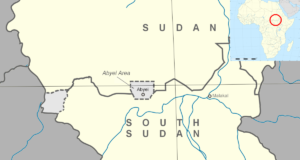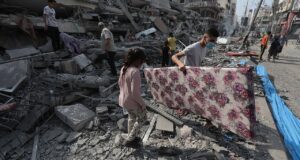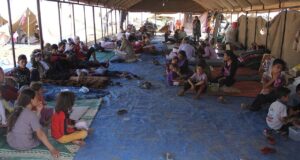Protecting the Russian world
What is the Underlying Strategy?
Ielizaveta Rekhtman – Human Security Centre
Policy Unit, Issue 3, No. 2.
In his speech to Russian ambassadors and diplomats on July 1st, President Putin defined Russia’s national interests with regards to current events in the world. A rather substantial part of his address was dedicated to the assessment of the Ukrainian crisis.
The term “Russian world” was mentioned in several Putin’s speeches, and his address to Russian diplomats is just a recent example – it is worthy of note that this term appears in Russian discourse on the Crimea and Eastern-Ukrainian conflict. The analysis of the “Russian world” concept is relevant for two reasons: firstly, it shows the foreign policy strategy that this concept implies and secondly, it explains the key terms of the Russian official discourse on the Ukrainian-Russian conflict. For this purpose, the article will introduce three quotations from Putin’s speech and suggest their implications.
Setting the Borders
“In Ukraine, as we have seen, our compatriots are under threat, Russian people and people of other nationalities, their language, history, culture, legal rights, which, by the way, are guaranteed by European conventions. When I say “Russian people” and “Russian-speaking citizens”, I mean those people who feel themselves a part of the so called broad Russian world, and they are not necessarily ethnic Russians, but those who perceive themselves Russian.” [1]
Having Christian Orthodox roots in Russian literature, the idea of the ‘Russian world’ was geopolitically conceptualised by several Russian thinkers, specifically Valeriy Tishkov. By the “world” Tishkov means a “transnational and transcontinental community” which is united by Russian language, Russian or Soviet culture and a certain “loyalty” and “attachment” to Russia [2]. According to the author, Russia is the heartland of the Russian people, language and culture; consequently, it is obliged to patronise Russians in the neighbouring states who are referred to as compatriots [3].
The borders of Russian world are flexible. As it is stressed in Putin’s speech, it is not the ethnic origin that determines whether a person is Russian, but the language he or she speaks. In addition, Russian people share a common identity, which is neither national nor political in its essence. It is rather a feeling of solidarity and belonging to Russian culture and history.
There are several reasons for Ukraine to be perceived as a part of Russian world. Firstly, for several centuries certain parts of Eastern, Southern and Central Ukrainian territories belonged to the Moscow State, which later transformed into the Russian empire. Then, for almost 70 years the Ukrainian Soviet Socialist Republic was a member of the Soviet Union. Apart from the historical factor, the number of Russian-speakers in Ukraine is substantial. All in all, the shared history, language and cultural similarities between Russians and Ukrainians are brought up in the Russian discourse on Crimea, Eastern and Southern Ukraine.
Commitment to Protect
“…Of course, we did not have a right to leave Crimeans and the citizens of Sevastopol to the outrage of militant nationalists and radicals, we could not tolerate the restriction of access to the Black Sea and the incoming of NATO military forces to the Crimea, which I think would have happened rather promptly and the balance of power in the Black Sea region would have changed drastically, to Sevastopol, which, actually, is glorified by Russian soldiers and sailors. In other words, virtually everything, that Russia has been fighting for since Peter times or maybe earlier, which historians know better, would have been eliminated.” [4]
As Crimeans meet the criteria of Russian people, particularly speaking Russian, sharing common Russian history and culture, through these discourses they can be considered to belong to the Russian world and hence have to be protected by Russia.
According to Russia’s official discourse, the recent political changes in Ukraine led to the nationalistic and radical right take-over of the state, which endangered all the minorities, specifically Russians and Russian-speakers. Despite the fact that Ukraine is not a NATO member, the Kremlin perceives a threat from NATO forces which could be positioned on Ukraine’s territory near Russian borders. The presence of the Russian Black Sea Fleet in Crimea is of strategic importance and it is difficult for Russia to comprehend a compromise on its position.
As a result, the actions of the Russian state have been officially explained as a response to the threat from Ukraine and the West – as such they are justified by the obligation to protect Russia and its national interests, as well as the broader ‘Russian world’.
Legitimisingthe Actions
“What reaction did our partners expect from us taking into account the recent events in Ukraine? I want everyone to understand that our state will protect the rights of Russians and our compatriots abroad in the future, and will use all the means in order to do so, from political and economic to humanitarian actions and the right to self-defense guaranteed by the international law.” [5]
The reiteration of Russia’s commitment to protect Russians and Russian-speakers throughout the world, particularly in Ukraine, is crucial for laying out ‘legitimate’ grounds for the political decisions and actions of the Kremlin. The mechanisms of establishing moral justification are mainly public statements and speeches, which are delivered by Russian officials, and the media.
The treaty on Crimea’s entrance into the Russian Federation, which was elaborated in accordance to Russian laws and with references to international law, was approved by Russian parliament and then signed by V. Putin [6, 7]. The emphasis of, and appeal to, legality in this case is important symbolism in President Putin’s attempts to frame these actions as a legitimate and neccesary foray into the Russian world. In doing so, Putin’s domestic constituency can be appeased, even if the ceremony appears hollow and illegitimate to the wider world.
Despite the fact that the Kremlin did not declare Russia’s military involvement in Eastern Ukraine, the strategy of ‘Russian world’ protection provides the desired moral justification for Russia’s participation in the conflict. Such a framing of Russian action is of great importance for the understandings of Western policy-makers, particularly if Russian inolvement should escalate.
In summary, the concept of ‘Russian world’ implies a three-step foreign policy strategy:
- Constructing the Russian world and common Russian people identity;
- Russia’s commitment to protect the Russian world and Russian interests from external threats;
- Legitimising Russia’s actions.
This strategy is implemented through a powerful mechanism of public discourse. Its strength is the ability to evoke a common identity in people of different ethnic origin and country of residence. The ‘Russian world’ concept establishes clear connections between ‘Russian people’ and Russia. However, it can be considered rather vague and mythical due to the absence of a legal framework and conceptualisation.
The case of Ukraine shows the efficiency of ‘Russian world’ discourse in gaining moral support for Russia’s military actions not only from the Russian public, but also in targeted areas of Crimea, Eastern and Southern Ukraine. The choice of timing and the circumstances for applying the concept determines its effect: the potential consequences of this discourse have been aptly demonstrated in the ongoing Ukrainian political crisis.
[1] The President of Russia web-site, http://www.kremlin.ru/transcripts/46131
[2] Tishkov V. Russian language and Russian-speaking Population of the Commonwealth of Independent States and Baltic States, http://valerytishkov.ru/cntnt/publikacii3/publikacii/russkij_yazyk_i_russkoyazychnoe_naselenie_v_stranah_sng_i_baltii.html
[3] Tishkov V. Russian language and Russian-speaking Population of the Commonwealth of Independent States and Baltic States, http://valerytishkov.ru/cntnt/publikacii3/publikacii/russkij_yazyk_i_russkoyazychnoe_naselenie_v_stranah_sng_i_baltii.html
[4] The President of Russia web-site, http://www.kremlin.ru/transcripts/46131
[5] The President of Russia web-site, http://www.kremlin.ru/transcripts/46131
[6] BBC News web-site, http://www.bbc.com/news/world-europe-26630062
[7] The President of Russia web-site, http://kremlin.ru/news/20605
Ielizaveta Rekhtman is a Research Assistant with the Human Security Centre.
Contactable at: ielizaveta.rekhtman@hscentre.org
Please cite this article as:
Rekhtman, I. (2014). ‘Protecting the Russian world: What is the Underlying Strategy?’. Human Security Centre , Policy Unit, Issue 3, No. 2.
 Human Security Centre Human Rights and International Security Research
Human Security Centre Human Rights and International Security Research




